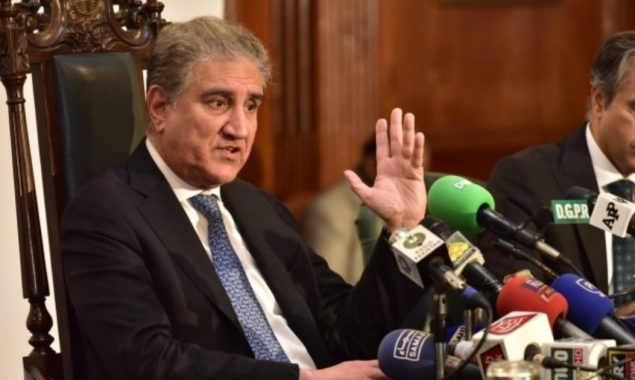
Foreign Minister Shah Mahmood Qureshi. Image: APP
ISLAMABAD: Pakistan has shifted its focus on geo-economics, which is a strategic change, a senior government official said on Tuesday.
Speaking at the diplomats’ session at the Margalla Dialogue, 2021, which comprised former US Ambassador Cameron Munter, former Pakistan foreign minister Hina Rabbani Khar, Chinese Deputy Ambassador Pang Chunxue, Russian Ambassador Danila Ganich, British High Commissioner Dr Christian Turner and Ambassador Robin Raphel Foreign Minister Shah Mehmood Qureshi said that the world order is in a state of stress, as the system is sliding again into bipolarity.
Pointing out at the Pakistan’s tangibles, he said, it has a youth bulge, and almost 64 per cent of its population is under the age of 18, and there is a daunting middle class of more than 80 million people.
While economics remains the focus at his ministry, exports are surging and is evident from the fact that they have increased 28 per cent and 7 per cent with the UK and Africa, respectively.
He also talked about the role that technology is playing in diplomacy, and hinted at the digital alliances under the supervision of Saudi Arabia.
“[The] data control is influencing the mindset and there is a long way to go in evolving muscles in the foreign policy, too,” he added.
Qureshi said that Pakistan’s relations with China are resilient and poised to grow. “The BRI is a flagship project that will link geography and economy with three continents: Asia, Africa and Europe,” he added.
Talking about the US relations, Qureshi said: “We want multifaceted ties in a broad perspective, encompassing investment, technology and climate change.”
Similarly, with Russia, Pakistan wants an open door policy in economic and security paradigms. “We will remain accessible to all the powers and work with them closely,” he added.
Pakistan is hoisting an extraordinary OIC foreign ministers’ moot on December 19, in an attempt to facilitate peace and humanitarian aid to Afghanistan, he said.
About India, Qureshi said: “Our quest for peace can’t be solo. And it takes two to tango.” Delhi’s policy to invade and lay siege to the Illegally Occupied Jammu and Kashmir and disenfranchise its people is toiling.
Former US ambassador Robin Raphel, while elucidating what went wrong in Afghanistan, said that Washington’s desire to modernise the war-torn country led to problems.
She said the powerful defence lobby in the US made use of the opportunities in Afghanistan, which exacerbated the crisis.
She acknowledged that the Taliban is an indigenous movement, and there is a need to work with the militia for normalising the situation.
Robin said the US still wants to retain a robust diplomatic presence in Afghanistan and work for smoothening affairs because the goal still remains the same, i.e., is to help Afghans become a modern state.
Humanitarian crisis is the most important issue and it should be addressed, she added.
Agreeing with Foreign Minister Qureshi’s contention, she said the world is becoming pluralistic with the US and China being two major competitors.
Likewise, former US ambassador to Pakistan Cameron Munter said that transnational issues are molding the foreign policies of the countries worldwide, and said that geopolitics to geo-economics has become a new reality.
He urged the need for redoing the face value of Pakistan, and urged that the entrepreneurs and intelligentsia are the new harbingers.
Recalling his days in Islamabad, Munter said that the mantra of ‘do more’ was irritating and a boring one.
The US wants Pakistan as a partner, and there is a lot that needs to be done for the region.
Munter called for looking from a new prism, and making people as the interacting force in bilateral relations.
Russian Ambassador to Pakistan Danila Ganich said that Moscow appreciates Pakistan’s role in the anti-terrorism operations and in Afghanistan.
He feared that the world is heading towards an accidental clash, and expressed the hope that it shouldn’t be nuclear.
Ganich also called for greater cooperation between the two countries in a new era of collaborations.
British High Commissioner to Pakistan Dr Christain Turner highlighted the potential of Pakistan’s populace, and said that it is where the momentum of economics resides.
A population of 380 million by 2050 is the biggest challenge for Pakistan, he said, adding that 1.5 million jobs creation is a must to stay afloat.
He also called for enhancing regional trade and said that Pakistan could see a 30 per cent rise in GDP if regional trade reaches its maximum.
China’s Deputy Ambassador Pang Chunxue observed that it is quite unfortunate that some states have politicised pandemic, and called for more collaboration in this regard.
More than 265 million people are affected by the Covid-19 worldwide, she said, adding that another two billion vaccines will be provided by China.
The Chinese envoy also underscored the need for high quality development in the China-Pakistan Economic Corridor (CPEC), adding that a closer and stronger Pakistan is important for China.
Read More News On
Catch all the Business News, Breaking News Event and Latest News Updates on The BOL News
Download The BOL News App to get the Daily News Update & Follow us on Google News.




